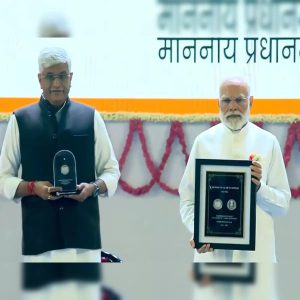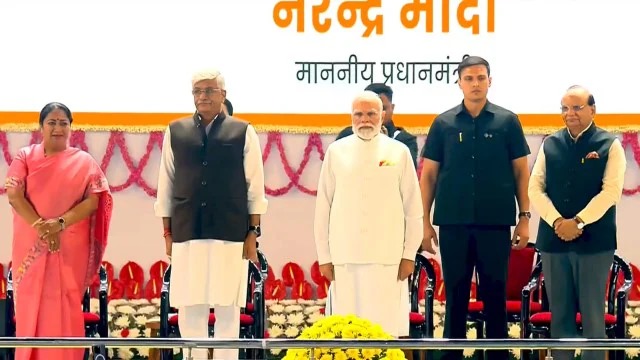Vande Matram — once a hymn of devotion — has now turned into a political weapon under Prime Minister Narendra Modi’s leadership. Read how BJP’s 150-year celebration of Vande Matram reflects a deeper attempt to merge religion with politics ahead of elections.
Dr. Mohammad Farooque, Qalam Times News Network
Kolkata, November 9, 2025
Vande Matram: From Hymn to Political Weapon
Vande Matram, a phrase once meant to invoke the spirit of devotion, has resurfaced as Prime Minister Narendra Modi’s new political mantra. Under the banner of celebrating its 150 years, the Modi government has transformed a cultural hymn into a test of patriotism — and in doing so, reignited India’s old debate over faith and nationalism.
The song, originally written in 1875 by Bankim Chandra Chatterjee on the banks of the Ganga in Bengal’s Hooghly district, was never intended as a political slogan. It was a hymn to Goddess Durga, expressing religious reverence rather than nationalistic fervor. Later, when it was included in Chatterjee’s 1882 novel Anandamath, its tone reflected the Hindu revivalist and idol-worship themes of that era.
Political Appropriation of History
Fast forward to 2025, the BJP government has turned the 150th anniversary of Vande Matram into a grand political spectacle. Instead of addressing rising unemployment (8.1%), soaring food inflation (14%), and increasing farmer suicides (6%), the central government allocated ₹218 crore to mark the occasion.

During a high-profile ceremony at Vigyan Bhawan in New Delhi on November 7, Prime Minister Modi claimed that the “omitted” part of Vande Matram contained “the soul of Bharat Mata,” accusing Congress of “political cowardice” for sidelining it. Soon after, Home Minister Amit Shah echoed Modi’s words, calling the omission of the full hymn a “historical injustice.”
Within hours, BJP spokespersons across TV channels amplified the message, declaring that Vande Matram should have been the “true national anthem” — effectively challenging the status of Jana Gana Mana chosen in 1947 by Nehru, Maulana Azad, and Dr. Rajendra Prasad to maintain India’s secular unity.
Regional Backlash and Controversy
The political theater didn’t stop in Delhi. In Kolkata, the BJP organized a “Vande Matram March” on November 8, featuring 36 state legislators. In response, Chief Minister Mamata Banerjee accused the Modi government of exploiting Bankim Chandra’s legacy for electoral gain. Trinamool Congress leaders reminded the public that parts of the hymn were religiously sensitive to Muslims, containing imagery of goddess worship that contradicts Islamic monotheism.
In Assam, tensions flared when Congress veteran Badhu Bhushan Das sang Amar Sonar Bangla at a rally — a song that, while originally written in 1905 against Bengal’s partition, later became Bangladesh’s national anthem. BJP leaders branded the act as “anti-national,” and Chief Minister Himanta Biswa Sarma ordered a sedition case against the 70-year-old politician — ironically ignoring the fact that Modi himself had once recited the same song in a 2014 Kolkata rally.
Meanwhile, in Karnataka, BJP MP Vishweshwar Hegde stirred another controversy, falsely claiming that Jana Gana Mana was composed in praise of King George V. Historical records clearly show it was sung for the first time at the Indian National Congress session in December 1911, when the British monarch was not even present.
A Calculated Distraction
Across these incidents runs a clear thread: the politicization of Vande Matram serves as a deliberate distraction from the government’s economic failures and rising inequality. By invoking religious sentiments, the BJP and RSS seek to consolidate their base while deflecting attention from unemployment, inflation, and social unrest.
Their cultural strategy has always been ideological — using literature, faith, and history as tools to foster religious polarization. From debates on hijab and halal to disputes over food and language, every issue is turned into a battlefield of identity. Now, Vande Matram has become the newest weapon in that arsenal.
Patriotism or Political Opportunism?
At its core, the question remains: does patriotism demand that Indians worship a hymn or question their poet laureates? Calling Jana Gana Mana “unpatriotic” or portraying Tagore as a “traitor” only weakens India’s secular ethos.
What’s clear is that for Modi’s government, Vande Matram is less a hymn of devotion and more a mantra for electoral longevity. Beneath the rhetoric lies a deep anxiety — the fear of being held accountable for economic decline and social division. When real answers run out, symbols become weapons.







